

African Arguments - Land ‘grabs’ in Africa. Lorenzo Cotula – International Institute for Environment and Development Recently, the media spotlight turned on so-called ‘land grabs’ – whereby agribusiness, investment funds and government agencies acquire farmland in Africa, Latin America and Asia.
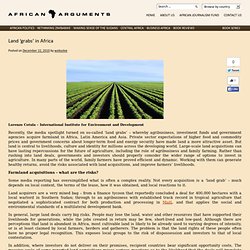
Private sector expectations of higher food and commodity prices and government concerns about longer-term food and energy security have made land a more attractive asset. But land is central to livelihoods, culture and identity for millions across the developing world. Large-scale land acquisitions can have lasting repercussions for the future of agriculture, including the role of agribusiness and family farming. Rather than rushing into land deals, governments and investors should properly consider the wider range of options to invest in agriculture.
Farmland acquisitions – what are the risks? Some media reporting has oversimplified what is often a complex reality. In general, large land deals carry big risks. Is there an alternative? Africa and the world food crisis: time to focus on solutions. Dabney Tonelli, managing partner of Chayton Capital LLP and MD of Chayton Africa (Pty) Ltd.
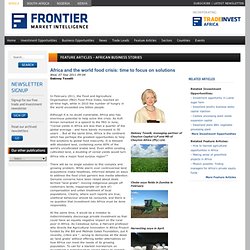
Chobe soya fields in Zambia in February Harvesting soya in April Preparing harvested crops for storage and transport in July. Photographs provided by Chayton Africa In February 2011, the Food and Agriculture Organisation (FAO) Food Price Index reached an all-time high, while in 2010 the number of hungry in the world exceeded one billion people.
Although it is no doubt vulnerable, Africa also has enormous potential to help solve this crisis. There will be no single solution to this complex and growing problem. At the same time, it would be a mistake to indiscriminately discourage private investment as that could have an equally negative impact on the rural poor in Africa. Attracting foreign investors can facilitate growth of the agricultural sector through commercial expansion, increasing yields by implementing techniques like conservation tillage, crop rotation, doubling cropping and irrigation. 1. UN expert calls for guidelines to protect vulnerable people against 'land grabs' William Bakeshisha, father of six, was evicted from land he claims was given to his father.
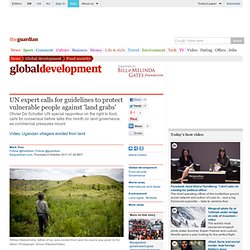
Photograph: Simon Rawles/Oxfam Governments should be wary of speculation and concentration of ownership when land rights are transferred to investors to "develop" farmland, a UN expert has warned before key UN negotiations on land governance. "We must escape the mental cage that sees large-scale investments as the only way to develop agriculture and to ensure stability of supply for buyers," said the UN special rapporteur on the right to food, Olivier De Schutter, amid concern among civil society groups about "land grabs". The recent surge in food prices has prompted investors and governments to focus on agriculture after decades of neglect. Silent forests and famine in east Africa. This article was written by Nobel peace prize winner Wangari Maathai in September, shortly before her death.

Indian agribusiness sets sights on land in east Africa. Indian agribusiness companies are ready to spend $2.5bn buying, or renting for decades, several million hectares of cheap land in Ethiopia, Tanzania and Uganda in what could be some of the largest farming deals struck in Africa in the last 50 years.
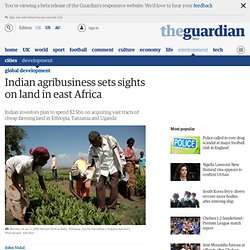
But in a separate development, plans for a US-based investment company to lease up to 1m hectares of South Sudan for only $25,000 a year appears to have stalled following protests by local communities over the potential "land grab". A delegation of 35 Indian investors, including food conglomerates McLeod Russel, Kaveri Seeds, and Karuturi Global, has been touring Ethiopia, Tanzania and Uganda for the last week to seek land to grow palm oil, maize, cotton, rice and vegetables, largely for the burgeoning Indian market.
US universities in Africa 'land grab' Harvard and other major American universities are working through British hedge funds and European financial speculators to buy or lease vast areas of African farmland in deals, some of which may force many thousands of people off their land, according to a new study.
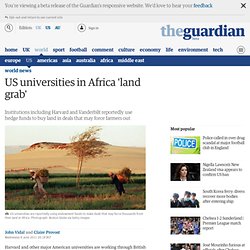
Researchers say foreign investors are profiting from "land grabs" that often fail to deliver the promised benefits of jobs and economic development, and can lead to environmental and social problems in the poorest countries in the world. The new report on land acquisitions in seven African countries suggests that Harvard, Vanderbilt and many other US colleges with large endowment funds have invested heavily in African land in the past few years. Much of the money is said to be channelled through London-based Emergent asset management, which runs one of Africa's largest land acquisition funds, run by former JP Morgan and Goldman Sachs currency dealers.
Emergent said the deals were handled responsibly. Oxfam calls on the New Forests Company to investigate Uganda land grabs claims. International Land Deals in Africa. The designations employed and the presentation of material in this publication do not imply the expression of any opinion whatsoever on the part of the Food and Agriculture Organization of the United Nations nor the International Fund for Agricultural Development concerning the legal status of any country, territory, city or area or of its authorities, or concerning the delimitation of its frontiers or boundaries.
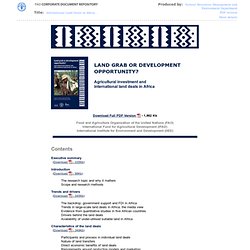
The mention of specific companies or products of manufacturers, whether or not these have been patented, does not imply that these have been endorsed or recommended by FAO or IFAD in preference to others of a similar nature that are not mentioned. The designations “developed” and “developing” countries are intended for statistical convenience and do not necessarily express a judgement about the stage reached by a particular country or area in the development process.
'Glen, Gary and Ross' - a film about land grabs. The new African land grab. The "town" chief of the village seemed to be in a state of shock.
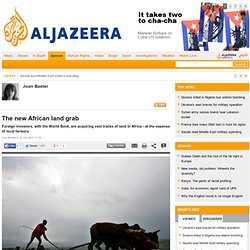
Sitting on the front porch of his mud and thatch home in Pujehun District in southern Sierra Leone, he struggled to find words that could explain how he had signed away the land that sustained his family and his community. He said he was coerced by his Paramount Chief, told that whether he agreed, or not, his land would still be taken and his small oil palm stand destroyed. He didn't know the name of the foreign investor nor did he know that it planned to lease up to 35,000 hectares of farmland in the area to establish massive oil palm and rubber plantations. Ugandan villagers evicted to make way for forestry company - video. Ethiopia at centre of land grab. Land Grabbing - The New Colonialism. Africa Land Grab: New Century, More Colonisers. Land and Power: The growing scandal surrounding the new wave of investments in land.